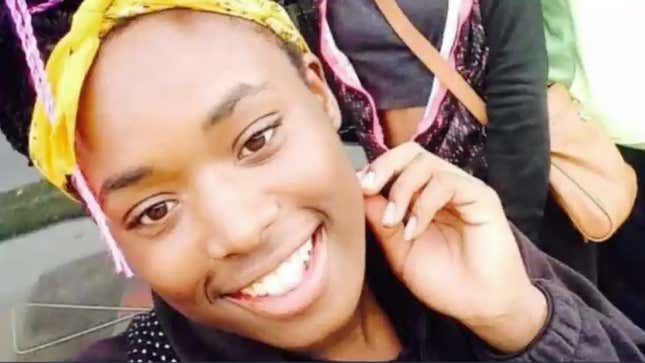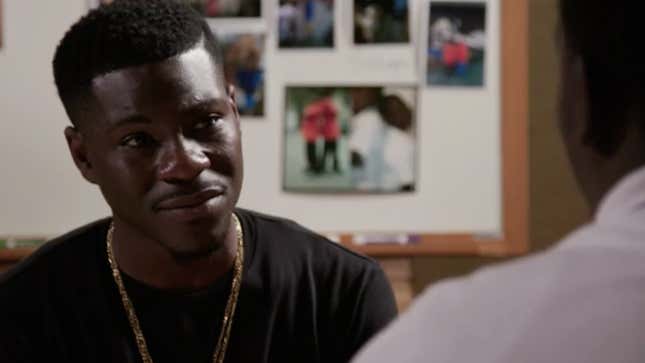
“True crime” has long been a popular genre of television—and as it’s grown in popularity, an increasingly sensationalist one. All too often, it desensitizes us to the fact that behind the gory details are real lives lost, communities in crisis, and broader cultural implications and circumstances that led to victims’ murders.
When MTV decided to make its own entry to the genre this year with True Life Crime, an expansion of its Emmy Award-winning True Life franchise hosted by award-winning journalist and MTV News host Dometi Pongo, the network attempted to take a different approach. As is MTV’s predominantly Gen-Z audience, True Life Crime’s subjects are young, and the issues surrounding their deaths are issues many young people face daily; including gang culture, bullying, online harassment, gendered violence and more.
“When I became a part of this series, I started to research, like ‘How would I want to do it?’” Pongo tells The Root. “I watched a lot of content, and I didn’t see the identities presented in a way we do.”

Airing its third episode this Wednesday night, True Life Crime’s newest subject is 16-year-old Kedarie Johnson, a black gender-fluid teen in Burlington, Iowa, murdered in 2016 under mysterious circumstances. As Pongo notes in the episode’s intro, the case is intensely personal; like Kedarie (and this writer), Pongo hails from Chicago. Ironically, Kedarie’s family moved to Burlington for “a better life,” ostensibly to escape the gun violence plaguing many of Chicago’s most dangerous neighborhoods. Nevertheless, the nonconformist but still-popular teen who unapologetically alternately identified as “Kandicee” would also ultimately die by gun violence. Their body, doused in bleach and found with a garbage bag around their head was found “riddled with bullets” in the underbrush of a residential alley in Burlington (h/t Des Moines Register).
The details of Kedarie’s murder and the outcome of its subsequent trial are readily available online—and surprisingly, Kedarie is one of the few victims of what appears to be gender-based violence to receive some substantive measure of justice, resulting in the conviction of their accused killers. But what Pongo and his team seek to uncover are not only the intricacies of the case but whether Kedarie was specifically targeted for their gender identity. Additionally, the episode explores the broader implications of gender-based violence and the criterion by which hate crimes are prosecuted in America. As a result, aside from simply recounting the facts, the episode confronts many of the longstanding ills plaguing contemporary society; including homophobia, toxic masculinity and policing tactics.
Surprisingly, it’s not only Kedarie’s humanity that comes into sharp focus in this True Life Crime’s episode. Detective Melissa Smith, one of the first law enforcement members sent to the scene of Kedarie’s murder, becomes a deeply empathetic figure in True Life Crime, demonstrating the type of compassion and empathy most of us would love to see within our local police forces (as well as the most constructive use of white woman tears we could possibly imagine). As Pongo explains, it was a surprise to him, as well, particularly in an age where the inhumanity of a few police officers has informed our general view of law enforcement. As it turns out, #notallpolice are virulent racists who are discriminate in their judgment.
“The thing about the series that I didn’t expect was how much it gave us a window into the humanity of police officers—into good police officers,” Pongo reluctantly admits, while acknowledging some officers haven’t moved quickly enough or cared enough about victims of color. “I think that’s another powerful thing about the True Crime series...we talk about why black communities don’t trust the police officers; why we’ve become so disenfranchised when it comes to interacting with the police,” he continues, quickly adding: “But there are a lot of stories in this series where you will see the humanity of police officers as they reflect the humanity of the victims, and that’s one of the most beautiful things I had to experience.”
Pongo also credits both MTV and people he respects working in the advocacy space with helping to educate and enable him to handle Kedarie’s unique story and its broader repercussions with care. “And then, I just talked to my friends in the LGBTQ+ community, and let them just check me on the things they needed to check me on, to make sure I was approaching this the right way,” Pongo adds. “It’s interesting; when it comes to diversity, I feel like a lot of general market reporters and general market outlets make it seem like this big, daunting task to understand how to tell a story about another human being.”
Some of the most striking statements in Kedarie’s episode come from trans rights activist and Executive Editor of Out magazine Raquel Willis, who urges us to consider how we speak about—and report on—the ongoing violence against gender-nonconforming people, particularly in regard to trans women of color. While Kedarie didn’t formally identify as trans at the time of their death and reportedly answered to both binary gender pronouns, the 16-year-old’s murder sadly echoes the type of violence we’ve seen perpetrated against trans women of color across the country. Also true is the fact that in many of these cases, the root cause of the murder was the perpetrator’s shame over their attraction to the victim; shame exacerbated by the homophobia that persists within segments of the black community.
“I think it’s important for us to look at all the cases of anti-trans violence as singular, unique instances because these people were singular and unique. Kedarie’s story is important; and so, it’s important for us not to reduce trans people to a number,” says Willis, sentiments echoed by Pongo.
“I hope it does have an impact; I really do,” he says, reflecting on his conversation with Kedarie’s brother, Cedric Peterson, who offers one of the most poignant responses to his sibling’s murder, urging men attracted to trans and non-conforming people to “just let your pride go; stop trying to be so tough all the time.”
“If just a few communities in the black community have that same conversation, then I feel like this episode has done what it was supposed to do,” says Pongo, reflecting on Kedarie’s bravery. “I’m hoping that people who are going through that journey—whatever that identity journey is—look to Kedarie as a good example of how to fight through it.”
MTV’s True Life Crime airs tonight, Wednesday, Jan. 22 at 9 pm ET/PT.

